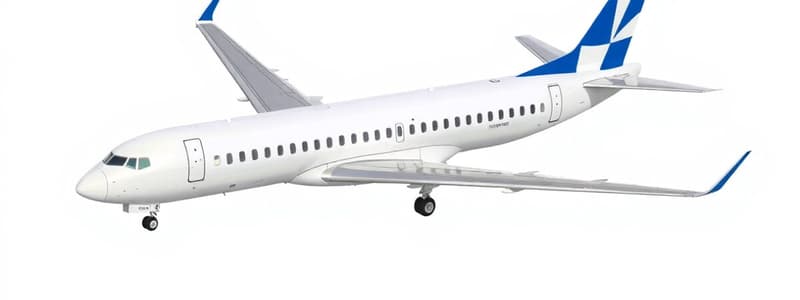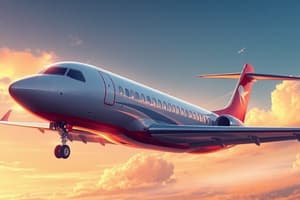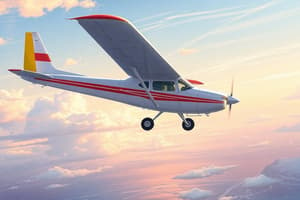Podcast
Questions and Answers
Who is eligible to deliver training for the Aeronautical Radio Operator Certificate?
Who is eligible to deliver training for the Aeronautical Radio Operator Certificate?
- A pilot instructor with a training endorsement (correct)
- Any registered pilot
- Any individual with aeronautical experience
- A student pilot
What is required for a person to operate an aeronautical radio?
What is required for a person to operate an aeronautical radio?
- Having a commercial pilot rating
- Being a registered pilot instructor
- Possession of a pilot licence
- Completion of training specified in the Part 61 Manual of Standards (correct)
Which of the following individuals can assess competency standards for operating an aeronautical radio?
Which of the following individuals can assess competency standards for operating an aeronautical radio?
- A student pilot with an AROC
- A flight examiner (correct)
- Any aeronautical engineer
- Any registered training organization
What scope does a registered training organization need to cover in order to deliver aeronautical radio operator training?
What scope does a registered training organization need to cover in order to deliver aeronautical radio operator training?
Which of the following is NOT a requirement for someone to conduct training on operating an aeronautical radio?
Which of the following is NOT a requirement for someone to conduct training on operating an aeronautical radio?
What is the purpose of entering a requirement in the aircraft technical log?
What is the purpose of entering a requirement in the aircraft technical log?
Who may require an inspection of the aircraft before issuing a Special Flight Permit?
Who may require an inspection of the aircraft before issuing a Special Flight Permit?
Which statement about the Special Flight Permit is correct?
Which statement about the Special Flight Permit is correct?
Which of the following is NOT a condition under which an aircraft can be operated on an SFP?
Which of the following is NOT a condition under which an aircraft can be operated on an SFP?
Which form is used to apply for a Special Flight Permit (SFP)?
Which form is used to apply for a Special Flight Permit (SFP)?
What could the role of an authorised person include regarding the SFP process?
What could the role of an authorised person include regarding the SFP process?
What happens to the SFP after it has been issued?
What happens to the SFP after it has been issued?
What should the applicant understand regarding inspections prior to SFP issuance?
What should the applicant understand regarding inspections prior to SFP issuance?
What is the primary purpose of a Special Flight Permit (SFP)?
What is the primary purpose of a Special Flight Permit (SFP)?
Who must complete an inspection of the aircraft before a Special Flight Permit is issued?
Who must complete an inspection of the aircraft before a Special Flight Permit is issued?
Which statement accurately defines a Registration Holder?
Which statement accurately defines a Registration Holder?
What must a Registration Holder provide as proof of their legal entity status?
What must a Registration Holder provide as proof of their legal entity status?
Who is responsible for the continuing airworthiness and maintenance control of an aircraft?
Who is responsible for the continuing airworthiness and maintenance control of an aircraft?
What is needed to be a Registered Operator?
What is needed to be a Registered Operator?
What defines a legal entity for becoming a Registration Holder?
What defines a legal entity for becoming a Registration Holder?
For which operations is an SFP NOT applicable?
For which operations is an SFP NOT applicable?
What information must be included on an aircraft manufacturer's data plate?
What information must be included on an aircraft manufacturer's data plate?
Where should the manufacturer's data plate be attached on the aircraft?
Where should the manufacturer's data plate be attached on the aircraft?
Which of the following is NOT required to be on the manufacturer's data plate?
Which of the following is NOT required to be on the manufacturer's data plate?
What is the purpose of attaching the data plate in a way that prevents it from being lost or defaced?
What is the purpose of attaching the data plate in a way that prevents it from being lost or defaced?
Which location is considered most appropriate for the identification plate on an aircraft with multiple doors?
Which location is considered most appropriate for the identification plate on an aircraft with multiple doors?
What governs the requirements for attaching a manufacturer’s data plate to an aircraft engine?
What governs the requirements for attaching a manufacturer’s data plate to an aircraft engine?
What is one of the elements that needs to be included in regards to the aircraft type on the data plate?
What is one of the elements that needs to be included in regards to the aircraft type on the data plate?
What condition must be met for CASA to grant an Aeronautical Radio Operator Certificate?
What condition must be met for CASA to grant an Aeronautical Radio Operator Certificate?
Which characteristic is required for the manufacturer's data plate's attachment?
Which characteristic is required for the manufacturer's data plate's attachment?
What is required for a holder of an AROC to transmit on an aeronautical radio frequency?
What is required for a holder of an AROC to transmit on an aeronautical radio frequency?
Under what circumstance can a person without an AROC transmit on aeronautical radio frequencies?
Under what circumstance can a person without an AROC transmit on aeronautical radio frequencies?
What does Part 21 of CASR 1998 ensure regarding Australian aircraft?
What does Part 21 of CASR 1998 ensure regarding Australian aircraft?
Which area is NOT included in the Certification and Airworthiness requirements of Part 21?
Which area is NOT included in the Certification and Airworthiness requirements of Part 21?
What is a component of the production certification outlined in Part 21?
What is a component of the production certification outlined in Part 21?
What primary focus does Part 42 of CASR 1998 have?
What primary focus does Part 42 of CASR 1998 have?
Which of the following is NOT a type of certification mentioned in Part 21?
Which of the following is NOT a type of certification mentioned in Part 21?
What is a requirement for a multi-engine aircraft of less than 5700 kg MTOW to be certificated in the Transport Category?
What is a requirement for a multi-engine aircraft of less than 5700 kg MTOW to be certificated in the Transport Category?
Which of the following categories can include aircraft in excess of 5700 kg MTOW?
Which of the following categories can include aircraft in excess of 5700 kg MTOW?
What is a characteristic of Primary category aircraft under CASR Part 21?
What is a characteristic of Primary category aircraft under CASR Part 21?
What is a primary benefit of the simplified certification procedures under CASR 21.24?
What is a primary benefit of the simplified certification procedures under CASR 21.24?
Which aircraft types may qualify for Primary category certification?
Which aircraft types may qualify for Primary category certification?
What does the purpose of Weight Schedules include for aircraft operators?
What does the purpose of Weight Schedules include for aircraft operators?
Which of the following describes the intent of CASR Part 21?
Which of the following describes the intent of CASR Part 21?
What is the purpose of issuing Noise Certificates?
What is the purpose of issuing Noise Certificates?
Flashcards
Transport Category Aircraft
Transport Category Aircraft
Aircraft that are designed for carrying passengers or cargo.
MTOW (Maximum Take-off Weight)
MTOW (Maximum Take-off Weight)
The maximum weight an aircraft can safely take off with, critical for certification.
CASR Part 25/29
CASR Part 25/29
Standards for Transport Category aircraft.
Commuter Category Aircraft
Commuter Category Aircraft
Signup and view all the flashcards
Primary Category Aircraft
Primary Category Aircraft
Signup and view all the flashcards
CASR Part 21
CASR Part 21
Signup and view all the flashcards
Special Flight Permits (SFAR)
Special Flight Permits (SFAR)
Signup and view all the flashcards
Aircraft Certification
Aircraft Certification
Signup and view all the flashcards
SFP Duration
SFP Duration
Signup and view all the flashcards
SFP Cancellation
SFP Cancellation
Signup and view all the flashcards
CASA Inspection
CASA Inspection
Signup and view all the flashcards
Registration Holder
Registration Holder
Signup and view all the flashcards
Registered Operator
Registered Operator
Signup and view all the flashcards
Proof of Eligibility
Proof of Eligibility
Signup and view all the flashcards
Legal Entity
Legal Entity
Signup and view all the flashcards
What is a Special Flight Permit (SFP)?
What is a Special Flight Permit (SFP)?
Signup and view all the flashcards
When is an SFP required?
When is an SFP required?
Signup and view all the flashcards
What is an SFP not?
What is an SFP not?
Signup and view all the flashcards
What can be exempted using an SFP?
What can be exempted using an SFP?
Signup and view all the flashcards
What happens before an SFP is issued?
What happens before an SFP is issued?
Signup and view all the flashcards
Who can inspect the aircraft before an SFP issue?
Who can inspect the aircraft before an SFP issue?
Signup and view all the flashcards
What are the conditions on an SFP?
What are the conditions on an SFP?
Signup and view all the flashcards
How is an SFP sent?
How is an SFP sent?
Signup and view all the flashcards
Aeronautical Radio Operator
Aeronautical Radio Operator
Signup and view all the flashcards
Part 64
Part 64
Signup and view all the flashcards
Who can train for an Aeronautical Radio Operator Certificate?
Who can train for an Aeronautical Radio Operator Certificate?
Signup and view all the flashcards
Who can assess for an Aeronautical Radio Operator Certificate?
Who can assess for an Aeronautical Radio Operator Certificate?
Signup and view all the flashcards
Part 61 Manual of Standards
Part 61 Manual of Standards
Signup and view all the flashcards
Aeronautical Radio Operator Certificate (AROC)
Aeronautical Radio Operator Certificate (AROC)
Signup and view all the flashcards
AROC Eligibility
AROC Eligibility
Signup and view all the flashcards
Who can transmit on an aeronautical radio?
Who can transmit on an aeronautical radio?
Signup and view all the flashcards
Type Certification
Type Certification
Signup and view all the flashcards
Airworthiness Certification
Airworthiness Certification
Signup and view all the flashcards
Production Certification
Production Certification
Signup and view all the flashcards
Manufacturer's Data Plate
Manufacturer's Data Plate
Signup and view all the flashcards
Data Plate Location
Data Plate Location
Signup and view all the flashcards
Engine Data Plate
Engine Data Plate
Signup and view all the flashcards
Model Designation
Model Designation
Signup and view all the flashcards
Serial Number
Serial Number
Signup and view all the flashcards
Study Notes
Part 23 Airworthiness Standards
- This code outlines airworthiness standards for the issue of Type Certificates (TCs) and changes to aircraft certificates.
- Categories covered include: Normal, Utility, Aerobatic, and Commuter.
Normal Category Aircraft
- Intended for non-aerobatic operation.
- Seating configuration (excluding pilot) of nine seats or less.
- Maximum Take-off Weight (MTOW) of 5700 kg or less.
- Must meet airworthiness standards of CASR Part 23 (aeroplanes) or Part 27 (rotorcraft), or be accepted from a recognized country.
- Very Light Aircraft (VLA) design requirements carry additional restrictions.
- These include single, non-turbine engine, two seats or less, MTOW of 750 kg or less, and stall speed of 45 kt or less in landing configuration.
Very Light Aircraft
- A very light aircraft must have two seats or less.
Utility Category Aircraft
- Applies to aeroplanes, gliders, and powered sailplanes for limited aerobatic operations.
- Seating configuration (excluding pilot) of nine seats or less.
- Maximum Take-off Weight (MTOW) of 5700 kg or less.
- Meets design requirements of CASR Part 22 or 23.
- Can be automatically accepted from a recognised country.
- Includes increased structural load and design dive speed factors compared to the Normal category.
- Limited aerobatic operations include spins (if approved), lazy eights, chandelles, and steep turns with a bank angle of more than 60° but not more than 90°.
Aerobatic Category Aircraft
- Applies to aeroplanes, gliders and powered sailplanes.
- Seating configuration (excluding pilot) of nine seats or less.
- Maximum Take-off Weight (MTOW) of 5700 kg or less.
- Can be flown without restrictions, except for those shown necessary during certification.
- Meets standards of CASR Parts 22 or 23 or automatically accepted from a recognised country.
Commuter Category Aircraft
- Intended for non-aerobatic operation.
- Multi-engine, propeller-driven aircraft.
- Seating configuration (excluding pilot) of 19 seats or less.
- Maximum Take-off Weight (MTOW) of 8618 kg or less.
- Meets design requirements of CASR Part 23.
- Offers higher safety than the Normal category due to increased performance, structural, and powerplant certification requirements.
Part 27
- Specifies airworthiness standards for Normal category rotorcraft.
- Max Take-off Weight (MTOW) of 3175 kg or less
- Up to 9 passenger seats
Parts 25 and 29
- Transport Category aircraft.
- Primarily for public transport of passengers and cargo.
- MTOW in excess of 5700 kg (aeroplanes) or 5700kg (rotorcraft).
- Meets standards of CASR Part 25 (for aeroplanes) or Part 29 (for rotorcraft), meets standards from a recognised country, or complies with predecessors.
Certification of Aircraft Parts and Appliances II (10.5)
- Learning objectives focus on the structure and intent of Part 21 of CASR 1998 (Special Flight Permits, Registration, Noise and Radio Station Licences)
- Additional learning objectives concern the purpose and issue of various certificates.
Primary Category Aircraft (Part 21)
- Identical to FAA Primary category.
- Intended for pleasure and personal use.
- Simplified certification procedures, allowing reduced CASA involvement.
- May be unpowered, have a single engine with a specific stall speed, and MTOW requirement.
- Optionally, may be a rotorcraft with a specific design limitation.
Special Flight Permits (SFP)
- Issued when a Certificate of Airworthiness (CofA) is temporarily invalid due to damage, maintenance, or non-compliance with airworthiness regulations.
- Allows operation of an aircraft for specific, non-routine purposes.
Registration (Part 47)
- Introduces concepts of Registration Holder (legal owner) and Registered Operator (responsible for continuing airworthiness).
- Registration holder must be an entity (individual, corporation, government agency).
Registered Operator
- Includes residents of Australia who are at least 18 years old
- Australian citizens, permanent visa holders, corporations, bodies, agencies, or foreign corporations.
Radio Station Licences
- For radio/communication equipment installed for all aircraft operations.
- Licensing requirements are addressed in AC21.13 for primary category aircraft.
Approval of Airborne Radio Systems
- Procedures for approval of radio systems' installation or modifications must adhere to CAO 100.37.
- The holder of the CofA or SFP is responsible for providing schedule and details required for installation.
Ground Operations Personnel Licensing (Part 64)
- Establishes rules for licensing ground personnel (AROCs).
- Handles privileges, requirements of Aeronautical Radio Operators Certificates (AROC).
Eligibility for AROC Certificate
- Defines eligibility criteria for those who wish to conduct training and assessment for a pilot or aircraft radio operator.
- It includes different categories of individuals.
Grant of Aeronautical Radio Operator Certificate
- The holder of an AROC is authorized to operate radios for air safety purposes.
- A person without an AROC can also operate the radio under direct supervision of an approved assessor.
Parts 21 and 42 of CASR 1998 (10.6)
- Describe in detail the structure and intent of Part 21 and 42 of CASR 1998.
Part 21 of CASR 1998
- Contains provisions ensuring the continuing airworthiness of Australian aircraft.
- Includes type certification, airworthiness certification, and production certification.
CASR Part 21 Definitions (Appliance, Article, ATSOA)
- Defines 'Appliance', 'Article', and 'Australian Technical Standard Order Authorisation (ATSOA)' as used in Part 21.
Production Certification and Approval
- Provides details regarding manufacturing approval under CASR Part 21.
- Two methods for achieving approval are described: Production under a Type Certificate (TC) only and Manufacture under a Production Certificate (PC).
Australian Parts Manufacturing Approval (APMA)
- Procedures for approving parts manufacturing.
- Describes engineering design and Fabrication Inspection System (FIS) requirements.
Australian Technical Standard Order Authorisation (ATSOA)
- Information outlines the requirements for the issuance of ATSOA and the regulations governing their use.
Identification of Aircraft and Aeronautical Products
- Explains the identification requirements for aircraft, including Aircraft Manufacturer's Data Plates (e.g., manufacturer's name, type certificate number, serial number, and model designation) attached to aircraft and parts. The data plate must be securely attached to the aircraft, typically near entrances.
Studying That Suits You
Use AI to generate personalized quizzes and flashcards to suit your learning preferences.
Related Documents
Description
Explore the standards of airworthiness outlined in Part 23, covering various aircraft categories including Normal, Utility, Aerobatic, and Commuter. This quiz delves into the specifics of Type Certificates and the criteria necessary for aircraft to be considered airworthy. Test your knowledge on Very Light Aircraft and other classifications.




